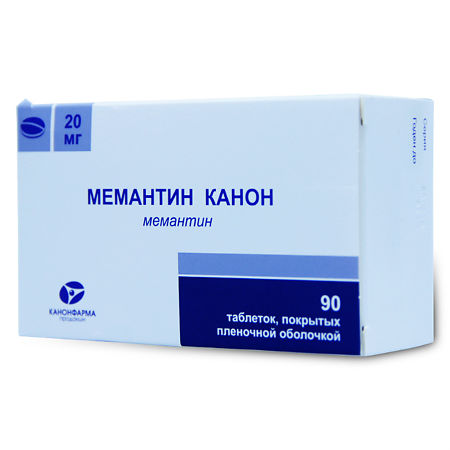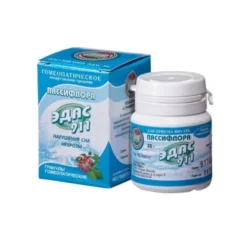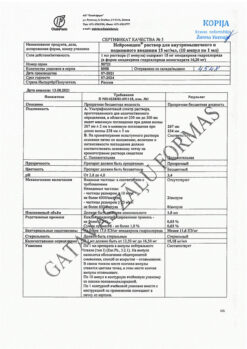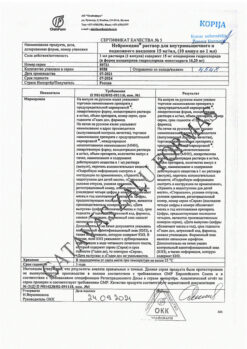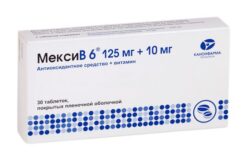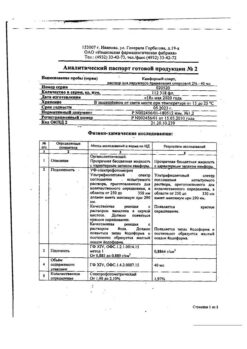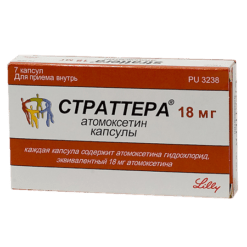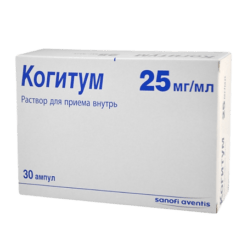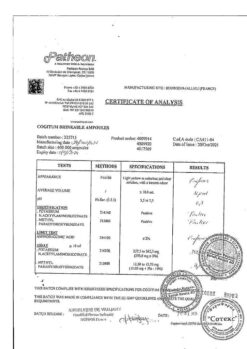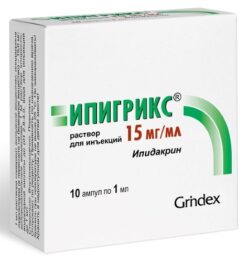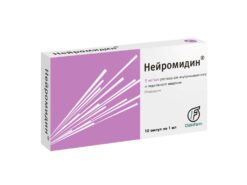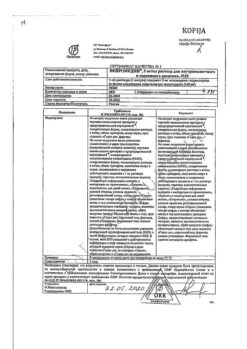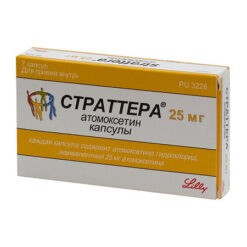No products in the cart.
Memantine Canon, 20 mg 90 pcs
€1.00
Out of stock
(E-mail when Stock is available)
Description
A treatment for dementia. It is a non-competitive antagonist of glutamate NMDA-receptors (including in the substantia nigra), due to this it reduces excessive stimulating effect of cortical glutamate neurons on neostriatum, which develops on the background of insufficient dopamine release. By reducing the Ca2+ influx into the neurons, it reduces the possibility of their destruction.
It has nootropic, cerebrovasodilatory, antihypoxic and psychostimulatory effects.
It improves impaired memory, increases ability to concentrate, reduces fatigue and symptoms of depression, reduces spasticity of skeletal muscles caused by brain disease or damage.
Pharmacokinetics
After oral administration, it is rapidly and completely absorbed from the GI tract. Cmax is reached after 3-8 hours. Binding to plasma proteins is 45%. Css of 70 to 150 ng/ml is achieved when administered at a dose of 20 mg/day. Vd is 10 l/kg. Partially metabolized in the liver. It is excreted by the kidneys. T1/2 is 60-100 h; clearance is 170 ml/min/1.73 m2.
< br>.
Indications
Indications
Moderate to severe dementia due to Alzheimer’s disease.
Pharmacological effect
Pharmacological effect
A drug for the treatment of dementia. It is a non-competitive antagonist of glutamate NMDA receptors (including in the substantia nigra), as a result of which it reduces the excessive stimulating effect of cortical glutamate neurons on the neostriatum, which develops against the background of insufficient dopamine release. By reducing the flow of Ca2+ into neurons, it reduces the possibility of their destruction.
It has nootropic, cerebrovasodilating, antihypoxic and psychostimulating effects.
Improves weakened memory, increases the ability to concentrate, reduces fatigue and symptoms of depression, reduces skeletal muscle spasticity caused by diseases or damage to the brain.
Pharmacokinetics
After oral administration, it is quickly and completely absorbed from the gastrointestinal tract. Cmax is reached after 3-8 hours. Plasma protein binding is 45%. When taken at a dose of 20 mg/day, a Css of 70 to 150 ng/ml is achieved. Vd is 10 l/kg. Partially metabolized in the liver. Excreted by the kidneys. T1/2 is 60-100 hours; clearance is 170 ml/min/1.73 m2.
Special instructions
Special instructions
Use with caution in patients with epilepsy, renal failure, thyrotoxicosis, a history of seizures, arterial hypertension, a history of myocardial infarction, or heart failure.
If renal function is impaired, the dose of memantine should be reduced.
Active ingredient
Active ingredient
Memantine
Composition
Composition
White or almost white, film-coated tablets, round, biconvex; almost white in cross section.
1 tab.
memantine hydrochloride 20 mg
Excipients:
calcium hydrogen phosphate dihydrate – 55 mg,
colloidal silicon dioxide – 5.2 mg,
croscarmellose sodium – 7.5 mg,
lactose monohydrate – 161.1 mg,
magnesium stearate – 1.8 mg,
povidone K30 – 9.4 mg.
Film shell composition:
opadry white – 8 mg, incl. hypromellose (hydroxypropylcellulose) – 2.7 mg, hyprolose (hydroxypropylcellulose) – 2.7 mg, talc – 1.6 mg, titanium dioxide – 1 mg.
Contraindications
Contraindications
Severe liver failure; pregnancy; lactation period (breastfeeding); children and adolescents under 18 years of age (the effectiveness and safety of the drug have not been studied); hypersensitivity to memantine.
Side Effects
Side Effects
From the nervous system: dizziness, headache, drowsiness, gait disturbance, confusion, hallucinations, convulsions, psychosis, increased excitability.
From the digestive system: constipation, vomiting, nausea, pancreatitis.
From the cardiovascular system: increased blood pressure, venous thrombosis, thromboembolism.
From the body as a whole: fungal infections, general weakness, increased fatigue, allergic reactions.
Interaction
Interaction
When used concomitantly, memantine can reduce the effects of barbiturates and antipsychotics.
The effects of baclofen and dantrolene may be altered by memantine (dose adjustment may be required with this combination).
The effects of levodopa, dopamine receptor agonists and anticholinergics are enhanced by concomitant use of NMDA receptor antagonists.
Due to the fact that memantine and amantadine are NMDA receptor antagonists, simultaneous use should be avoided due to the risk of toxic effects.
Combinations of memantine with ketamine, dextromethorphan and phenytoin are also potentially toxic.
The same renal cationic system is used to transport amantadine, cimetidine, ranitidine, quinidine, quinine and nicotine in the body, which may cause the interaction of these drugs with memantine, leading to an increase in its concentration in the blood plasma.
When used concomitantly, memantine may cause a decrease in the concentration of hydrochlorothiazide in the blood serum.
When used simultaneously with warfarin and other indirect anticoagulants, careful monitoring of prothrombin time and INR is required.
Overdose
Overdose
Symptoms
In cases of overdose at a dose of less than 140 mg once or in case of taking an unknown dose, patients experienced adverse reactions from the central nervous system: confusion, hypersomnia, drowsiness, dizziness, agitation, aggression, hallucinations, gait disturbance; as well as disorders of the cardiovascular system: vomiting, diarrhea.
With relatively large overdoses (200 mg once and 105 mg/day for 3 days), the following symptoms were noted: fatigue, weakness and/or diarrhea or no symptoms.
In the most severe case of overdose, the patient survived after taking a dose of 2000 mg of memantine and experienced central nervous system adverse reactions (coma for 10 days, followed by diplopia and agitation). The patient received symptomatic treatment and plasmapheresis. The patient recovered without further complications.
In another case of severe overdose, the patient survived and recovered after taking 400 mg of memantine as a single dose. The patient experienced adverse reactions from the central nervous system: anxiety, psychosis, visual hallucinations, decreased seizure threshold, drowsiness, stupor and loss of consciousness.
Treatment
There is no specific antidote for memantine intoxication. Standard measures should be taken to remove the drug from the body: gastric lavage, taking activated charcoal, performing forced diuresis, increasing the acidity of urine.
Manufacturer
Manufacturer
Kanonpharma production CJSC, Russia
Additional information
| Manufacturer | Kanonfarma Production ZAO, Russia |
|---|---|
| Medication form | pills |
| Brand | Kanonfarma Production ZAO |
Related products
Buy Memantine Canon, 20 mg 90 pcs with delivery to USA, UK, Europe and over 120 other countries.

